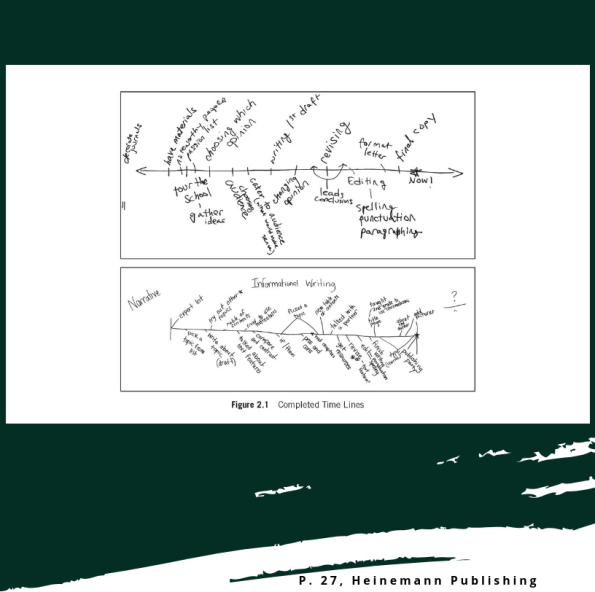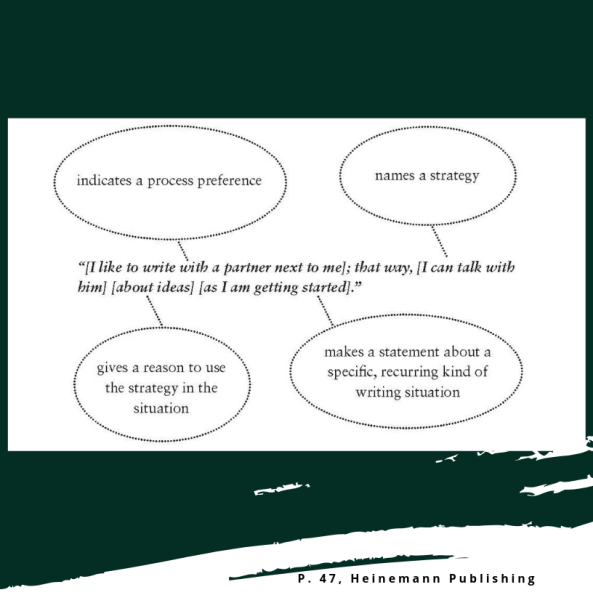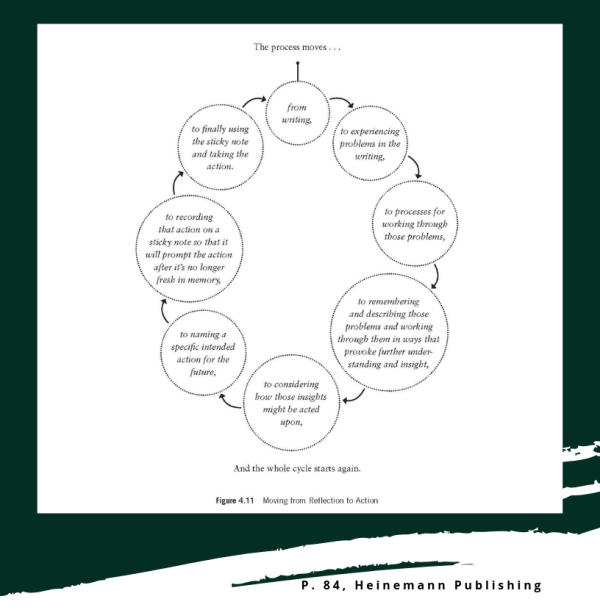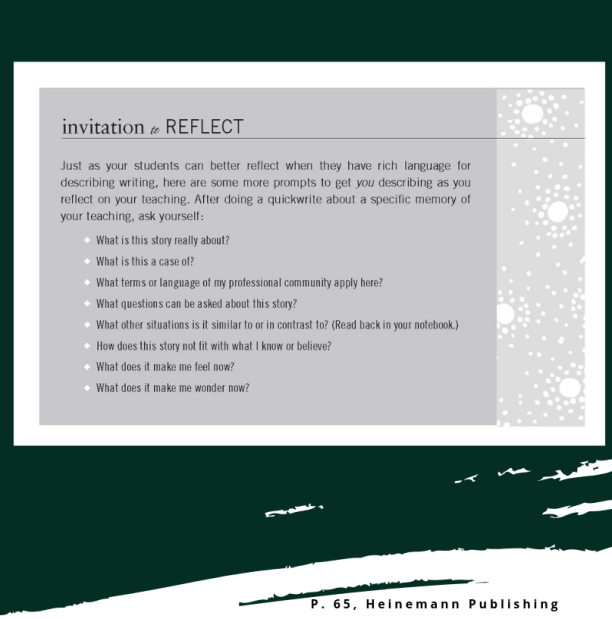My teaching experiences have allowed me to work with a range of age groups over almost two decades of my life. As a teacher, being a reflective practitioner is a non-negotiable for me, with different environments allowing different levels of reflection. I feel, as a writer, my reflection has grown tremendously in my practice. I would believe my practice as a teacher has had the same outcome.
Teaching Writers to Reflect: Strategies for a More Thoughtful Writing Workshop by Anne Elrod Whitney, Colleen McCracken, and Deana Washell brought me to new places in my thinking while tidying up the pieces of reflection that feel most daunting when working to encourage reflection from my writers. I know I’ve been guilty of wondering, at times, if reflection was genuinely possible for children at varying levels of development. Can they really think about what and how they are doing in such an abstract way? I appreciated the message from Whitney, McCracken, and Washell in this expertly put together professional book. The most important piece of that message being directly in the title, TEACHING. Reflection is not an automatic practice. It is a tool to be used, explored, and explicitly taught through the critical work we do with our students.
In order to teach reflection and not just anticipate its arrival, Whitney, McCracken, and Washell recommend three components with strategic lessons to implement each.
The three components include:
- Remembering what has been practiced
- Describing this practice with precise language
- Acting on the information gained from the reflection
They also suggest that students should articulate, in writing, their identities as writers. Offering open-ended statements like, “I’m a writer who…(p.3)” allows students to show us how they already see themselves as writers and guides us as we create supportive environments. The way students identify as writers can become an essential informant in our classrooms.
After introducing the critical components I mentioned above, the authors devote one chapter to each with ways to implement the practice of remembering, describing, and acting.
One strategy shared for teaching students to remember was creating a timeline of what has been taught. Students record, in a co-created way, a memory map of lessons and work that has been done across a unit. This strategy of recording and sequencing not only offers support to the verbal discussion that can take place, but it is also a road map of where they’ve been.
In the chapter devoted to writers learning to describe, precise language was important and the use of verbs as a tool help in this practice of description. I loved this visual representation that shows how a writer might talk about what they did using language that is precise and descriptive. It also shows how we can guide students to honor the pieces of their writing process within this description.
Creating a list, including verbs like listen, talk, think, revise, and communicate, as a reference gives students a word or phrase to jump from in their own conversations about their writing.
From here, readers will then be invited to think about how we can assist our students into action. Teaching writers to act on their reflections. This also encourages a shift on our part, removing scaffolds and allowing ownership of the learning for individual students.
We know we shouldn’t do it for them because we won’t always be there to direct them, and this is why we put so much energy into teaching them how to plan their own future writing actions (p. 81).
The process of remembering, describing, and acting is a complex one. This image from page 84 articulates this complexity in a digestible way. For me, I think it is the complexity that makes the act of teaching reflection a daunting one. What I love about this book is the breakdown of each component and the strategies the authors have shared for achieving reflection in our writing workshop.
It is only fair that if we are to anticipate and expect our students to take on the attributes of reflection that we do so as well. Woven throughout the book are invitations for the reader to reflect.
Reflection is a practice we can choose to engage in, and we can bring our students with us to develop how we remember, describe, and act. If you would love a copy of this book, you can enter to win one free from Heinemann Publishing by leaving a comment below. Reading this book the past two weeks has been refreshing for me as a learner, and it may be a timely read for you too. Happy writing, reading, and reflecting!
For more information and a free sample download of the book Teaching Writers to Reflect: Strategies for a More Thoughtful Writing Workshop, click here!
- This giveaway is for a copy of Teaching Writers to Reflect: Strategies for a More Thoughtful Writing Workshop. Many thanks to Heinemann Publishing for donating a copy for one reader.
- For a chance to win this copy, please leave a comment about this post by Thursday, February 28th at 11:59 p.m. EST. I’ll use a random number generator to pick the winners, whose names I will announce at the bottom of this post, the following day.
- Please be sure to leave a valid e-mail address when you post your comment so I can contact you to obtain your mailing address if you win. From there, my contact at Heinemann Publishing will ship your book out to you. (NOTE: Your e-mail address will not be published online if you leave it in the e-mail field only.)
- If you are the winner of the book, I will email you with the subject line of TWO WRITING TEACHERS – Giveaway. Please respond to my e-mail with your mailing address within five days of receipt. Unfortunately, a new winner will be chosen if a response isn’t received within five days of the giveaway announcement.








Would love to read this book
LikeLike
Looks like a really helpful text!!
LikeLike
I know that I have become a better teacher as I have reflected more. I would love to read more of this book!
LikeLike
As an IB educator, reflection is part of our learning and teaching process. Nonetheless, so many times we don’t give enough space and time to our students and ourselves to really reflect on our inquiries. I would love to have Anne Whitney’s book to find more strategies that I can use with my students and my own writing.
LikeLike
Reflection is so important. A good reminder for myself to build in more time as part of the writing process. Thank you!
LikeLike
I would love to read more of this book!
LikeLike
There is never enough time for thoughtful reflection. This book would be an excellent resource in my work with teachers and students.
LikeLike
So glad I saw a tweet about this book. The example pages are very helpful in deciding on whether it will be useful. A lot of evidence it will!
LikeLike
This looks a wonderful book. I need to make more time to reflect.
LikeLike
The reflection prompts seem so simple, but so far away many times. Thanks for the lists and dialogue!
LikeLike
I’m always interested in diving into resources on finetuning the writers workshop! Being more thoughtful about reflection, both for myself as a teacher and my students as writers, is always a goal of mine.
LikeLike
Looks like a useful resource. I appreciate the focus on reflection during writers workshop. I ask students at then end of each day to reflect on their day and make goals for the next. This is a perfect support.
LikeLike
What a great resource for any teacher of writing. Can’t wait to read it!
LikeLike
I can’t wait to read this book! I’m so excited about it.
LikeLike
This looks like a great resource. I’m interested in the time lines of strategies.Thank you for giving this book to someone.
LikeLike
Whitney is hands down one of the most influential educators in my time. Most of my original core values and strategies came from our interactions at PSU. I couldn’t be more excited to think deeply about transitioning reflection from my internal process to the students. Especially with reflection coming even more with restorative approaches for relationships, I can see it’s power extending to writing. If I don’t win the copy I’ll probably purchase some for myself and teacher friends.
LikeLike
This post is fantastic and reminds me how we can never expect students to reflect and goal set to the highest level that will truly push their growth forward without modeling, demonstrating, and teaching them how to first. Reflection and goal setting are such critical components to improving student achievement and growth. Such a wonderful post with immediate takeaways to implement right away. Excited to check this book out more.
LikeLike
This is a new book for me. I’m better at reflecting myself than teaching reflection.
LikeLike
That image of the writer’s timeline with precise language alone, makes me want this book so badly! I LOVE it! I’m very reflective in my teaching, and am always looking for ways to support this skill in my students. I’ve been making it a point to not only use precise writing language in my mini lessons, but in my conferences with students as well. It has helped get away from them simply summarizing the piece they are working on. When I meet with them, they now say things like, “I’m working on my introduction, and I’m trying to hook my reader.” : ) Music to the writing teacher’s ears… I hope I win!!!!! Fingers crossed…
LikeLike
I’ve been focusing on improving my writing instruction this year. I’d love to read it!
LikeLike
I would love to be able to share the nuggets of wisdom in this gem with my colleagues. This post has really piqued my I interest.
LikeLike
Reflection can be a challenge for people of all ages. I know I have to make myself truly sit down and authentically reflect when the situation, topic or even lesson was not one that I want to relive. Our students, especially the young ones need to be taught how to reflect as well as the power & groth that working through reflection can bring. I look forward to reading this new resource. Thank you for sharing.
LikeLike
This book intrigues me and I may purchase. I have never thought of making a timeline of writing strategies ( or teaching points) but it’s brilliant. It could springboard into more self reflection and assessing growth at the end of the year but most importantly possibly aid reluctant writers )and we know what and who they are) name these strategies they aren’t using to help them grow.
LikeLike
Co-creating a timeline of the learning that occurred during the unit is such a great idea! I love that so thank for sharing that example. This looks like a must read resource, especially as it may also transfer over to those of us adults who also have reflecting on our own work as a goal.
LikeLike
Reflection is a challenge for me as a writer, I think the excerpts from this book can guide everyone by improving out reflective practices.
LikeLike
I teach writing alongside teachers across grade levels and think this could be a wonderful resource.
LikeLike
I believe this book would help writers groups outside of schools, as well. I’m a retired teacher who has reviewed books for Middleweb (Heinemann included) and other sites. I’d love to win a copy!
LikeLike
As a literacy consultant/coach working with 3rd-5th grade teachers who’ve had little to no training in writing instruction, but who are ready and willing to learn and grow instructional practices, refection is critical – for them as well as for their young writers. Thank you for sharing this intriguing resource. It is one I will request for our professional library.
LikeLike
Sounds like an interesting read.
LikeLike
This looks like an amazing resource. I really appreciate the concrete examples you included in the post. Great stuff to try out today!
LikeLike
I often struggle with reflection and have found it difficult to get students engaged in meaningful reflection. These ideas highlighted are quite interesting! I look forward to reading this book! Thank you for sharing!
LikeLike
This is an interesting and timely post, as we we are working on revision, and students who “scored” well do not see the need to reflect or revise. I also really like the idea of mapping to show where we started to where we are now. I wanted to do some sort of reflection over our growth as writers throughout the year, and this is a step in the right direction. Thanks for sharing!
LikeLike
As an instructional coach, I have been having a lot of conversations about engaging students in spending a greater time in revising part of the writing process. I’m going to seek out this resource as it seems it would be great for supporting those conversations.
LikeLike
Great ideas in this book! I can’t wait to check out this wonderful resource!
LikeLike
I am excited to try these ideas with my writer’s. I am looking for ways to help them reflect on their writing process.
LikeLike
Reflecting on our writing is SO important. Asking students to identify who they are as a writer is powerful. I want to try out the timeline idea next week!!
LikeLike
I love that this book teaches how to make this work with students but also how to make it work in our own writing. Thanks for sharing. dgrohman@somsd.k12.nj.us
LikeLike
This sounds great! I often feel like my reflecting is shallow, and not engaging. I can’t wait to implement this in my classroom!
LikeLike
I would love to learn more about this!
LikeLike
Love the idea of more reflection. I know how important it is yet it is often cut out due to time constraints. Good reminder for me, now I’m thinking about how I can get it into my schedule regularly.
LikeLike
Thank you for writing such critical information. I definitely want to read it and hope I win!
LikeLike
This looks like a great book. During the busy days/times of life, it can be hard to “find” time to reflect, so it is important to remember to make time for what is important. One way of the other, I’ll be a reader!
LikeLike
I love the strategies you share here! The book sounds fantastic!
LikeLike
I began asking students to reflect on their writing this year, but was very disappointed in their bland, rote responses. After reading – and reflecting on! – this post I realize that part of the problem Is that I haven’t explicitly taught them how to reflect. Looking forward to reading this book and trying it with my students.
LikeLike
I would love infuse more reflection into my students’ writing lives. I can’t wait to try the odeas you shared and would love a chance to win this book!
LikeLike
Just as a writer teacher has a different view of students as writers, so will a reflective teacher view the need for students to be reflective writers.
Great post!!!
LikeLike
The timeline is a fantastic idea to invite students to reflect on their learning. I have been wondering how to encourage my students to spiral back and review the minilessons I’ve taught. Flipping the timeline vertically will make it easier to write on the lines. This fits hand in glove with the “looking back” and “moving forward” reflection minilesson explained here: https://twowritingteachers.org/2018/04/29/student-self-reflection-looking-back-and-moving-forward/
LikeLike
YES! Great connection to Beth’s post.
LikeLike
So many times reflection doesn’t happen in the hustle and bustle of a busy day and overwhelmed educators. Thank you for this post.
LikeLike
Reflection is often difficult for students. Great ideas. Would love to dive into them more by winning this book.
LikeLike
This is so smart, Betsy! I just love this and want to use some of these strategies right away with my kiddos!!
LikeLike
Decision-making rests on reflection. Through the eyes of our students we move forward with purpose. It would be an honor to reflect through the ART of refection.
LikeLike
I am so excited to read this book. I have been looking closely at writing workshop practices after reading Ralph Fletcher’s Joy Write! I’ve been on a journey with my teachers and this book will for perfectly into our work!
LikeLike
This looks like a wonderful resource! I’m so intrigued by what you’ve highlighted here, especially the time lines of strategies. I’m already considering how those might work in my classroom–for both me and my students. Thank you so much for sharing this book and for the opportunity to win a copy.
LikeLike